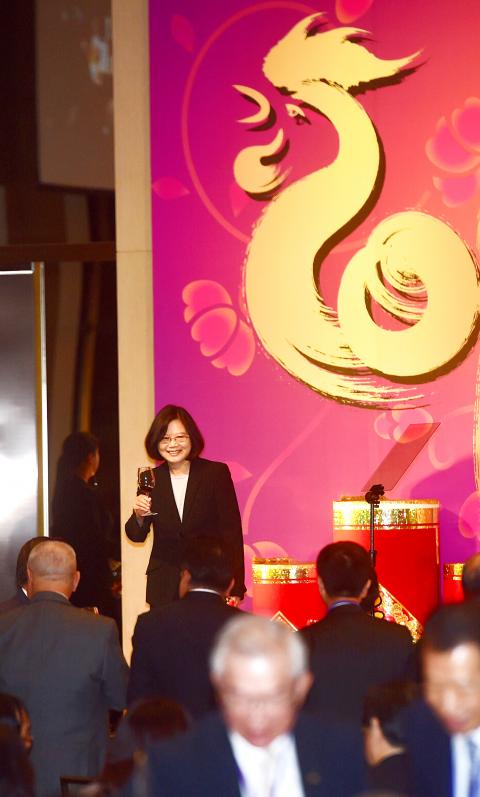President Tsai Ing-wen (蔡英文) yesterday encouraged China-based Taiwanese businesspeople to return to and invest in their home nation, while calling for a new mindset and way of doing things in cross-strait interactions.
Tsai made the remarks in a speech at a Lunar New Year gathering in Taipei with China-based Taiwanese businesspeople organized by the Straits Exchange Foundation.
“I learned from the Straits Exchange Foundation that some of our Taiwanese businesspeople belonging to the Association of Taiwan Investment Enterprises on the Mainland are planning to return home and invest in the Sanyi Wood Sculpture Park in Miaoli County’s Sanyi Township (三義),” Tsai said.

Photo: Chien Jung-fong, Taipei Times
They intend to build sculpture schools and tourism factories, as well as expand the Sanyi Wood Sculpture Museum, in an effort to promote the town’s tourism industry and facilitate its industrial upgrade, Tsai said.
Praising the idea, Tsai said that the government would be more than willing to provide its full support and assistance to businesspeople returning home.
Turning to the state of cross-strait relations, Tsai said the development of economic ties over the past three decades has had a profound influence on the lives of people on both sides of the Taiwan Strait.
“However, amid a new international environment and the growing economic ties between the two sides, which have seen mutual interests and room for cooperation in economic and regional development, we need to jointly create a new cross-strait interaction model, with a new mindset and a new way of doing things,” she said.
“Only by doing so can we respond to the shared expectation of people on both sides of the Strait and in the [Asia-Pacific] region for peace,” she added.
Her administration is willing to demonstrate its greatest goodwill, and engage in a genuine dialogue and negotiation with Beijing, to create a benign and mutually beneficial economic partnership, Tsai said.
“We also call on Beijing to deal with the various problems and difficulties faced by Taiwanese businesspeople and safeguard their legal rights, free of any political intervention,” she said.
The speech was Tsai’s latest effort to extend an olive branch to China, despite her administration’s reluctance to accept the so-called “1992 consensus.”
The “1992 consensus” — a term former Mainland Affairs Council chairman Su Chi (蘇起) said in 2006 that he had made up in 2000 — refers to a tacit understanding between the Chinese Nationalist Party (KMT) and the Chinese government that both sides acknowledge there is “one China,” with each side having its own interpretation of what “China” means.
After the gathering, the honorary chairman of the association, Kuo Shan-hui (郭山輝), quoted Tsai as saying that the government plans to table a new cross-strait policy to resolve the stalemate, probably later this year.
“However, given that no breakthrough would be seen regarding [Beijing’s] precondition on the ‘one China’ principle and the ‘1992 consensus,’ the current obstacles and deadlock across the Taiwan Strait could continue,” Kuo said.
Asked about the reduced attendance at yesterday’s gathering compared with previous years, Kuo said it was due to businesspeople’s concerns about the government’s efforts to promote cross-strait ties, not the result of political pressure from Beijing.
Additional reporting by CNA

CHAOS: Iranians took to the streets playing celebratory music after reports of Khamenei’s death on Saturday, while mourners also gathered in Tehran yesterday Iranian Supreme Leader Ayatollah Ali Khamenei was killed in a major attack on Iran launched by Israel and the US, throwing the future of the Islamic republic into doubt and raising the risk of regional instability. Iranian state television and the state-run IRNA news agency announced the 86-year-old’s death early yesterday. US President Donald Trump said it gave Iranians their “greatest chance” to “take back” their country. The announcements came after a joint US and Israeli aerial bombardment that targeted Iranian military and governmental sites. Trump said the “heavy and pinpoint bombing” would continue through the week or as long

TRUST: The KMT said it respected the US’ timing and considerations, and hoped it would continue to honor its commitments to helping Taiwan bolster its defenses and deterrence US President Donald Trump is delaying a multibillion-dollar arms sale to Taiwan to ensure his visit to Beijing is successful, a New York Times report said. The weapons sales package has stalled in the US Department of State, the report said, citing US officials it did not identify. The White House has told agencies not to push forward ahead of Trump’s meeting with Chinese President Xi Jinping (習近平), it said. The two last month held a phone call to discuss trade and geopolitical flashpoints ahead of the summit. Xi raised the Taiwan issue and urged the US to handle arms sales to

State-run CPC Corp, Taiwan (CPC, 台灣中油) yesterday said that it had confirmed on Saturday night with its liquefied natural gas (LNG) and crude oil suppliers that shipments are proceeding as scheduled and that domestic supplies remain unaffected. The CPC yesterday announced the gasoline and diesel prices will rise by NT$0.2 and NT$0.4 per liter, respectively, starting Monday, citing Middle East tensions and blizzards in the eastern United States. CPC also iterated it has been reducing the proportion of crude oil imports from the Middle East and diversifying its supply sources in the past few years in response to geopolitical risks, expanding

An Emirates flight from Dubai arrived at Taiwan Taoyuan International Airport yesterday afternoon, the first service of the airline since the US and Israel launched strikes against Iran on Saturday. Flight EK366 took off from the United Arab Emirates (UAE) at 3:51am yesterday and landed at 4:02pm before taxiing to the airport’s D6 gate at Terminal 2 at 4:08pm, data from the airport and FlightAware, a global flight tracking site, showed. Of the 501 passengers on the flight, 275 were Taiwanese, including 96 group tour travelers, the data showed. Tourism Administration Deputy Director-General Huang He-ting (黃荷婷) greeted Taiwanese passengers at the airport and